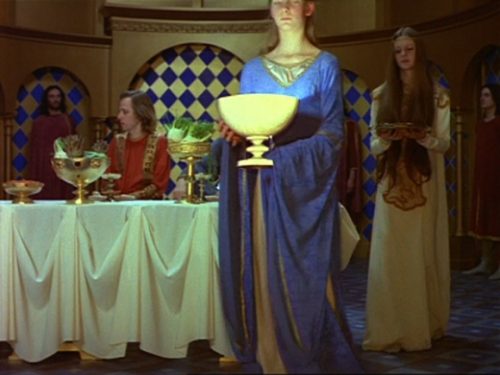Rohmerathon: The Marquise of O / Perceval le Gallois, by Scott Nye
I hadn’t intended to take such a long break in this series, but as the next film up – The Marquise of O (1976) – left me thoroughly befuddled, I had hoped the following film – Perceval le Gallois (1978) – might clarify it somewhat. However, at 140 minutes, it was a tough proposition for these many, busy months. I am happy to say, however, that the latter did help illuminate the achievements of the former, both of which are wildly outside what we might come to expect from Rohmer’s typical milieu in terms of time and place, but which are really quite singular and remarkable in their own way. Auteurism provides a way to see less-obvious aspects of one film by how they’re more pronounced in another, but it also becomes something of a trap – when films don’t immediately give us “that Eric Rohmer feeling”, they somehow become less desirable. Where once we herald an artist for their distinctiveness, we soon pigeonhole them into extending no further. “We,” in this case, being “I.”
Perceval le Gallois is a film completely unto itself, so much so that I had to throw out the challenge to my cinephile brethren to find a film that remotely resembles it. Even those who came up with something close admitted they weren’t quite there; everything nearby is a base or two off. Based on an unfinished 12-century poem by Chrétien de Troyes, it tells the story of an ambitious and foolhardy young knight (Fabrice Luchini) as he makes a vague quest for the Holy Grail, but mostly gets caught up in battling other soldiers over petty matters, bedding young women through exaggeration or force, and all around perverting every piece of wisdom imparted to him. The entire film takes place on a colorful soundstage designed to heighten artifice rather than realistically situate us in its Arthurian time period; a great deal of the onscreen action is summarized by the characters performing it or in song by a recurring chorus; the dialogue is put into rhyming verse whenever possible; and as protagonists go, Perceval is maybe the least sympathetic of Rohmer’s already-numerous unlikeable men.
On the style of the film, Rohmer had this to say: “I made Perceval as much out of love for the text itself as for the cinema, which I treated, as was the case with Die Marquise von O, more as a means than an end. A means of serving literature. Why not, after all?… [M]aking Perceval was also a means of getting off certain well-trodden paths, of avoiding the trap of naturalism, which I feel has completely exhausted its possibilities. In the relationship between literary and filmic narratives, in the way my actors learned to speak, in the play between the stylised and the real, I hope I may have enriched cinema a little…well, let’s just say I don’t believe I’m in the rear guard.”
As such attempts go, there are few more successful than Perceval. Like its source, it turns it is stodgy, wearying, repetitive, but truly beautiful and always musically triumphant in brutal irony to the behavior it depicts. Early on, Perceval encounters a young woman alone in a tent. Taught by his mother the proper way to treat a lady, he demands she accept his good graces, nearly raping her in his determination to see that through. He cannot fathom why she would not accept and reciprocate his “manners”, which are deployed brutishly, nor can he imagine the terrible fate that will become her once her husband returns (and so, too, is the audience allowed to put that out of their mind until her return late in the film).
The Marquise of O also concerns an act of violence towards a woman done in the name of affection, but there the perpetrator does not stop with a kiss. Adapted from Heinrich von Kleist’s 1808 novella, it is Rohmer’s first and only film in German, but as he seems able to speak any language required of him, this is hardly an obstacle at all in directing his cast. The story concerns a widow (Edith Clever; her title – Marquise – marks her late husband as a nobleman, and thus herself as a noblewoman) who becomes pregnant, but nobody believes her claim that she has been entirely celibate since her husband’s passing. We have reason to believe her, but I’ll keep that our little secret for any future viewers out there. The only honest option available to her, as her family sees it, is to marry her off again so that this does not cause a scandal. A decorated count (Bruno Ganz) makes himself available to do the honor, but she does not know if she can trust him, knowing him as little as she does. And gradually, the forces of late 18th-century European society bear down on her. Clever is remarkable in the lead role, and Rohmer’s wise decision to keep Kleist’s story almost entirely within her point-of-view valuably pivots it from the self-obsessed men in whom the filmmaker has to this point specialized. The further her conflict with her family moves along, the more Clever seems to be physically suffocating, her character literally breathless at the realization that their professed love and trust in her only extends so far. It is only when she reaches her private estate – which Rohmer introduces by way of its lawn, in contrast to her parents’ stifling halls – that she is able to breathe and regain a sense of self.
I have mentioned in passing that this series was motivated and is guided by Potemkine’s magnificent box set collecting Rohmer’s entire filmography, all but three of his features appearing on Blu-ray. It has become necessary now to foreground this fact. Having heard that this was among Rohmer’s most beautiful films, and being overwhelmingly pleased with the presentation of the Six Moral Tales (especially the color works), I was considerably disappointed by the overly-scrubbed and shiny appearance of this otherwise-impressive film, and I fear that impression may have had a sizable impact on my relative appreciation for this film. In hindsight, further removed from the actual experience of watching it, The Marquise of O now seems a greater film, substantive and lovely, evoking the art of its time period without being slavish to it and uses romance imagery to undercut the deplorable situation in which the Marquise finds herself, and with which she is finally complicit. I worried for much of the time that her role would be purely that of victim, a narrative position all too analogous to reality but often dramatically inert, but a late reversal complicates our understanding of her, the degree to which we might have cheered her on, and causes us to question our own moral compromises.
Perceval, too, ends on a very disquieting note, similarly suggestive of the inability to claim or even explain the world in moral terms. We have seen the terrible deeds Perceval commits, how much evil can be wrought from sheer ignorance, and how little such people – when successful – are truly made to question their actions, or able to take seriously what few questions are posed to them. Not that this has any relevance in 2016, of course, but somehow it stood out to me nonetheless.





























